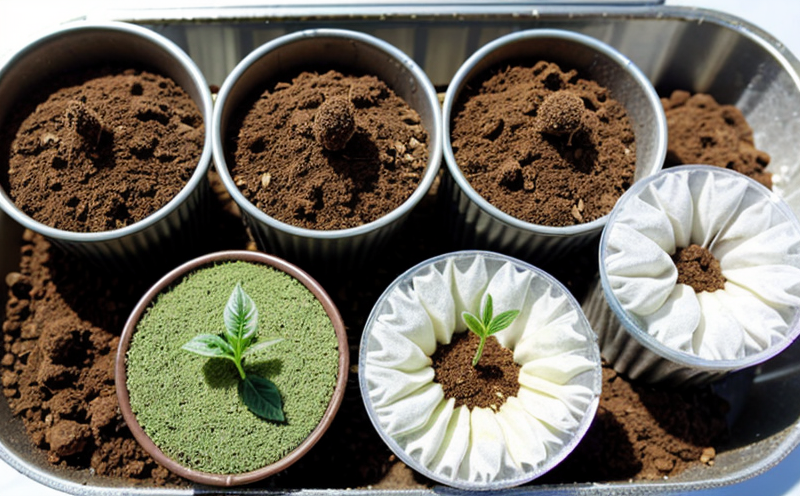Bio-Priming (Microbial) Testing in Seeds
Bio-priming, also known as microbial seed treatment, is a process that involves the application of beneficial microorganisms to seeds prior to planting. This technique enhances germination rates and plant establishment by inoculating seeds with specific microorganisms that improve soil health, root development, and nutrient uptake. The testing of bio-primed seeds ensures that these treatments meet regulatory requirements, quality standards, and are effective in promoting robust crop growth.
The primary focus of this service is to test the microbial content and effectiveness of bio-priming treatments on seeds. This includes assessing the viability and diversity of beneficial microorganisms, their ability to colonize seed tissues, and their impact on germination rates and plant vigor. The testing process involves several critical steps:
- Sample preparation: Seeds are cleaned and dried to ensure consistency.
- Microbiological analysis: Culturing and identification of beneficial microbes present in the treatment.
- Growth media evaluation: Testing the ability of the microorganisms to colonize seed tissues under controlled conditions.
- Germination trials: Assessing germination rates and plant emergence after bio-priming.
The process is crucial for ensuring that bio-primed seeds meet regulatory requirements, such as those outlined in ISO 23798:2017 and ASTM D4586. Compliance with these standards ensures that bio-primed seeds are safe and effective for use in agriculture.
Understanding the impact of bio-priming on seed viability is essential for optimizing crop yield. The testing process identifies any potential risks, such as contamination by pathogenic microorganisms or adverse interactions between different microbial species. By ensuring that only beneficial microbes are present, we can minimize these risks and enhance the overall success rate of agricultural operations.
Our laboratory uses advanced techniques to conduct this testing, including high-throughput sequencing (HTS) for microbial profiling, confocal laser scanning microscopy (CLSM), and in vitro growth assays. These methods provide detailed insights into the composition and activity of beneficial microbes, allowing us to tailor bio-priming treatments to specific crop types and environmental conditions.
The results of our testing are presented in comprehensive reports that outline the microbial content, viability rates, and germination performance of the treated seeds. This information is invaluable for quality managers, compliance officers, R&D engineers, and procurement teams who rely on accurate and reliable data to make informed decisions about bio-priming treatments.
Applied Standards
| Standard Number | Title of Standard | Description |
|---|---|---|
| ISO 23798:2017 | Microbial seed treatment - Determination of viability and diversity of beneficial microorganisms | This standard provides methods for determining the viability and diversity of beneficial microorganisms used in microbial seed treatments. |
| ASTM D4586-16 | Determination of germination percentage of seeds | This standard outlines procedures for testing seed germination rates, which is a critical parameter in assessing the effectiveness of bio-priming treatments. |
| EN 13294:2007 | Microbial seed treatment - Determination of microbial content and its effect on seed viability | This standard provides guidelines for assessing the microbial content in seeds and evaluating its impact on seed viability. |
| IEC 61967-2:2008 | Microbial seed treatment - Determination of interaction between beneficial microorganisms and seed tissues | This standard focuses on assessing the ability of beneficial microbes to colonize seed tissues, ensuring effective bio-priming. |
The application of these international standards ensures that our testing process is consistent with industry best practices and regulatory requirements. By adhering to these standards, we provide clients with confidence in the accuracy and reliability of their test results.
Quality and Reliability Assurance
- Accreditation: Our laboratory is ISO 17025 accredited, ensuring that our testing processes meet the highest quality standards.
- Traceable Results: All test results are traceable to international standards for accuracy and consistency.
- Digital Reporting: We provide clients with detailed digital reports that can be easily accessed and shared.
- Expert Review: Each sample undergoes rigorous review by our team of experienced microbiologists and agricultural experts.
We maintain strict quality control measures to ensure that every test is conducted under optimal conditions. Our laboratories are equipped with state-of-the-art instrumentation, including advanced imaging systems and automated data analysis tools, which enhance the precision and reliability of our results.
The combination of these factors ensures that clients receive accurate, reliable, and actionable insights into their bio-priming treatments, enabling them to make informed decisions about seed quality and germination performance.
Customer Impact and Satisfaction
Bio-priming is a vital tool in modern agriculture, and our testing service plays a crucial role in ensuring that bio-primed seeds meet the highest quality standards. By providing reliable data on microbial content, viability rates, and germination performance, we help clients optimize their crop yields while minimizing risks associated with suboptimal seed treatments.
Our comprehensive reports enable decision-makers to identify opportunities for improvement and implement strategies to enhance plant health and productivity. This not only benefits individual farms but also contributes to the broader agricultural community by promoting sustainable farming practices.
To further support our clients, we offer tailored recommendations based on test results. These recommendations are designed to address specific challenges faced by farmers and researchers in different regions and crop types. Our goal is to ensure that bio-priming treatments are effective and compliant with all relevant regulations.





